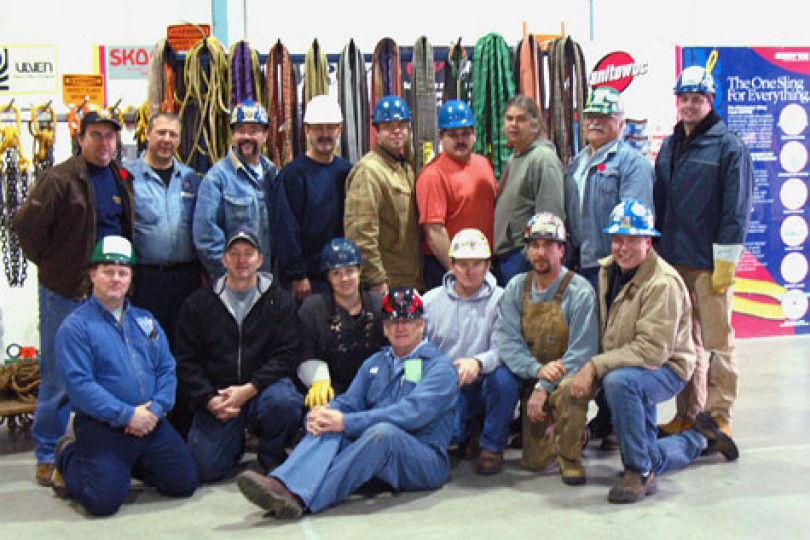Pictured above are national coordinator Grant Jacobs (seated); kneeling, l. to r., L-73 rigging instructor Eric Lindsay (Halifax, Nova Scotia); L-128 welding instructor Ron Sostomi (Toronto, Ontario); L-146 instructor j’Amey Holroyd (Edmonton, Alberta); L-146 executive board member Darwin Leitch; L-555 instructor Jim Beauchamp (Winnipeg, Manitoba); and ITI instructor Mike Parnell. Standing, l. to r., are L-128 training coordinator Ed Frerotte; L-128’s Marc Guay; L-359 instructor Russell Osborne (Vancouver, British Columbia); L-73 training coordinator Eugene Leblanc; L-359 instructor Alfred Bennett; L-73 rigging instructor Samuel Basque; L-128 safety instructor Blair Allin; L-349 training coordinator Joe Kiwior; and L-146 welding examiner/instructor Jason Carroll.
Event features four-day Master Rigger course
CANADIAN APPRENTICE TRAINING coordinators and their staffs attended the second annual train-the-trainer conference Nov. 5-9 in Woodland, Wash. Grant Jacobs, national training coordinator, said the conference is designed to prepare and equip local union training instructors to provide “first-rate training programs for our members.”
He said the conference also allows Boilermaker trainers to compare methods used in their home locals. “A lot of practical advice and ideas are exchanged at this event as the instructors discuss how they do training and what types of courses they offer ― and the resources they use.”
The 2006 conference featured a four-day rigging course conducted by Mike Parnell, owner of Industrial Training International (ITI) at the firm’s national headquarters. All participants received a Master Rigger certificate.
The ITI course, designed for those who have completed basic rigging instruction, included both classroom instruction and practical exercises. Participants split into teams that competed, on the final day, in a “Survivor-style” marathon, said Jacobs, alluding to the popular television series. All teams were evaluated on safety, teamwork, procedures, and time. Topics included load control, center of gravity, winch systems, jacking and rolling equipment, air-assisted load movement systems, D/d ratios (a measuring standard used to avoid wire rope fatigue due to excessive bending), effects of shock loading, load weight estimation, load factors for sling angles, inspection of rigging gear, rigging accident case studies, riggers’ checklist, rigging design, multiple hitch systems, load turning and load drifting, special load handling, hazard recognition, hitches and pick points, and lift planning.
The ITI course also included instruction on classroom teaching techniques and delivery methods. “Even the most seasoned and experienced participants in this course felt the four-day training program was very valuable and they learned a lot,” Jacobs said.
Jacobs noted that the Boilermakers’ national training program has completed a rigging handbook and will soon complete a rigging training manual. These materials will be used in local lodge training programs, focusing on practical rigging from Level One to Master Rigger. Each Canadian local intends to conduct at least a Level One course during 2007.






